#medieval stringed instruments
Explore tagged Tumblr posts
Text
2024 raw footage: Pastimes strings set
Sunday August 25th – Pyrate Invasion
youtube
Raw footage 11/119
Definitely something a little different than my normal videos, as Pastimes is neither in-house nor adjacent to the same. Specializing in “real old music on real old instruments by really old people”, Pastimes is educational as much as they are entertainment. This is the type of show I would attend if I were not running from in-house show to in-house show, for it is the sort of history I adore; but as I am a slut for the in-house shows, I have not once attended a Pastimes set. This was filmed by my mother, whose priorities at PARF differ significantly from mine, leaving her free to capture such things.
#pastimes historical music#pastimes historical instruments#medieval music#renaissance music#medieval instruments#renaissance instruments#stringed instruments#medieval stringed instruments#renaissance stringed instruments#parf-fan archiving#parf-fan videos#parf video 2024#pennsylvania renaissance faire 2024#pa renaissance faire 2024#pa ren faire 2024#parf 2024#parf#pa ren faire#pa renaissance faire#pennsylvania renaissance faire#pennsylvania renaissance faire video#pa renaissance faire video#pa ren faire video#parf video
0 notes
Text
THE FUXKING?????? DEVIL???? LURKING ABIUT MY HOUSE?? IS HITTING ON ME!!!!!
#WILL THEY STOP IT!!!!!!#for the love of god LEAVE ME ALONE. you ANIMALS#three days ago you were treating my very sweet best friend like a dog!! did you think i forgot?????#also like. christ it's getting goofy.#all of these characters cannot possibly be down this bad for my five hit points gnome with a fucked up face and a medieval string instrument#get OUT of here#also i just spent a beautiful morning watching the sunrise with my darling girlfriend. go away
0 notes
Text
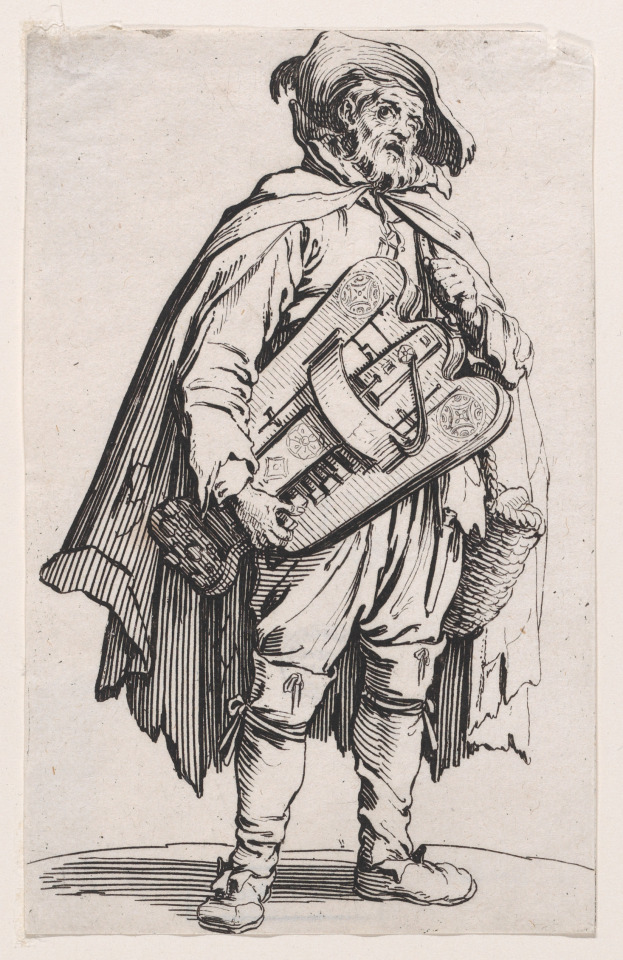
The Hurdy-Gurdy Player (Le Joueur de Vielle) at the Metropolitan Museum of Art
Did you know that the hurdy-gurdy is a string instrument that has been around since the Middle Ages? Initially, it was used for sacred music, but over time, it became famous for playing popular and folk music.
It even found favour at the French court! Although it experienced a decline in popularity, it is currently experiencing a resurgence and can be found in various genres, from traditional folk to progressive rock and avant-garde music.
Interestingly, the reason for its name is unknown, but it is speculated that it may be related to the sound it produces.
Unlike other string instruments, the hurdy-gurdy creates sound by rubbing its strings with a rosined wheel. It also has drone strings that create a buzzing accompaniment to the tune, similar to bagpipes that create a buzzing accompaniment.
If you want to learn more about the hurdy-gurdy, click the link here.
#ancient technology#ancient traditions#artifacts#bagpipes#folk music#hurdy-gurdy instrument#medieval#middle ages#sacred#string music#music
0 notes
Text
I updated my Hans/Henry playlist somewhat (still with the intention that all the music included sounds like something you could realistically hear back then. Or at least at medieval fairs). Many of them are instrumental, though not all!
There is an actual reasoning for most songs, and in the fashion of playlist of ye olde days, I'll write an explanation for them below the cut.
(the youtube one has more songs simply because some do not exist on spotify, but I tried to match them as much as possible)
Explanation:
The Medievals - Schiarazula Marazula the melody has a long history and with a variety of lyrics accompanying it. Eventually Angelo Branduardi transcribed it with lyrics from the point of view of Death, and although in medieval times it probably was not associated with Death, I thought it might be a good starting point - Hans and Henry meet because of the tragedy of Skalitz.
Gothien - Saderaladon a silly song about a peasant, at the beginning of spring, woken up by a nightingale's song. The peasant joins the bird by playing a citole. In the last verse (which is missing in Gothien's version), the bird gets angry that a peasant heard it :D I thought the song fits the Hans-Henry KCD1 relationship very well
Kalabalik - La Sansonette; Klíč - Taneček; Gallagher's Frolics; Musica Canora - Skudrinka; Jar - Słowiański Taniec; Elthin - Czaldy waldy A string of dance songs, I thought it might be a good way to symbolize the majority of the KCD2 relationship - there's a lot of pushing and pulling, running around and rejoining only to be separated again. I did go for happy-sounding melodies since Hans and Henry are comfortable enough with one another
Elthin - Douce dame Jolie (& Francouzský tanec - Středověká hudba) A popular medieval love song. I wanted some French melody to represent the Taking The French Leave quest. Henry and Hans are reunited, Hans speaks in a very soft and heartfelt way during and after it. Although in game the romance doesn't begin just yet, the feelings are there.
Oj chmielu ("Oh, Hop") A Polish folk song sung during weddings, to symbolize Hans receiving the news about his marriage. This rendition has a rather desperate, fearful vibe which I find very fitting.
Veratus - Vänner och Fränder Another song to symbolize Hans' fears about the wedding. The song is about a girl who was to be married to a prince, but chose to run away with her true love - the poor Roland.
Bryd one breere ("Bird on a briar") A song that is a plea for love "Gracious lady, on me have pity; or prepare for me my grave." Thought that it would be a good way to show the internal thoughts Hans has towards Henry before the romance scene.
Otep myrhy ("A Bundle of Myrrh") & Andělíku rozkochaný ("Frolicking Little Angel") Czech love songs to represent reciprocated love.
Veratus - Laude novella sia cantata A prayer to Virgin Mary for safety; to represent Hans' point of view during Henry's suicide mission. Veratus' version has this lovely quick, upbeat melody, I think it's very nice at conveying urgency rather than despair.
Corvus Corax - Mit Dans is all die werlt genesen ("With dance the whole world is healed") To represent a happy ending.
#kcd2#kingdom come deliverance#I spent too long thinking about it haha#also it's longer than classical playlists and with more instrumental songs than necessary#but in my defense I like to listen to songs like this in the background and I made this mostly for me :')#I took away 'In Taberna' I think it's a very fitting song but I can't have a love playlist beginning with it.......... I just can't...#music#Spotify
169 notes
·
View notes
Text
The princess and the fool
Jester!Gojo x Princess!Reader
Medieval Court AU
Summary : The halls of the castle are always cold. I have grown used to it, the chill, the silence, the feeling of existing yet never truly being seen. Then the jester arrives.
English is not my first language, I apologize in advance for any grammatical or spelling mistakes. Feel free to point them out but be kind with it♡
°•♡•°
The great hall is alive tonight.
The long tables overflow with food, the scent of roasted meats and spiced honey thick in the air. The golden chandeliers shine a warm glow over the gathered nobles, their laughter filling the room. Musicians play a lively tune, filling the air with the sharp trill of flutes and the deep hum of stringed instruments.
I sit at my place near the high table, not beside my father, nor near my brothers. Those seats belong to those with purpose. I am here because it is expected, nothing more.
Then, a voice cuts through the revelry.
"Ah, my lady of eternal gloom!"
The hall hushes, if only slightly, as heads turn toward the source of the voice.
I lift my gaze.
He stands in the center of the hall, a stark contrast to the muted elegance of the court.
Silver hair glows under candlelight, strands falling messily over his forehead, though I sense the disarray is intentional. His clothing-a jester’s garb in rich crimson and gold-is striking, adorned with delicate embroidery that glimmers when he moves. The bells at his sleeves and boots barely chime, as if he is too graceful to let them.
But his eyes...
His eyes are the most dangerous of all.
A shade of blue so bright they seem otherworldly, sharp with amusement yet unreadable beneath the weight of something deeper.
His grin is reckless, the kind that belongs to a man who has never known restraint.
"If I dare say," he continues, spreading his arms wide, as if addressing the entire court, "I have met ghosts with more cheer than you, oh princess of goom"
A murmur ripples through the gathered lords and ladies. Some chuckle behind their goblets of wine, while others glance at me, waiting to see how I will respond.
I say nothing.
I just hold his gaze
Then, as if nothing has happened, I lower my eyes back to my plate.
The moment passes. The court resumes its chatter. The musicians play again. The jester- whoever he is- laughs and continues his performance, spinning through the hall with charm.
But I can feel it.
Even as he entertains the crowd, his presence filling every inch of the room, those piercing eyes keep finding their way back to me.
And I can't helpt but wonder, what is it that he sees?
°•♡•°
I see him before he speaks.
It has been this way ever since that first night.
Whenever we are in the same room, his gaze seems to find me. Even when he is performing for the nobles, spinning tales and juggling goblets of wine without spilling a a single drop, I feel the weight of his attention.
I do not know why.
Perhaps he has taken it as a challenge: to crack the stonefaced silent princess, to pry a laugh from lips that rarely part.
Perhaps he is simply a fool.
His laughter echoes through the great hall again and I can not seem to withhold myself from lifting my gaze in the direction of the sound. His eyes almost seemed to glimmer in the warm glow of the chandelier suspended above the table. Lips pulled in a wide grin, his teeth-fangs- almost seemed to glint as if sending off a warning to stay away.
His head shifted and tilted to the side, I moved my gaze up to realize he had caught me admiring him. The jester did not seemed to mind though, he only blinked one eye in a quick wink.
What a fool.
°•♡•°
A week later, the feast is the same as always. Lords and ladies drink, their voices growing louder after every emptied goblet. Musicians pulling their strings until their fingers ache, the servants moving between tables like shadows, unseen, unnoticed.
My eyes swept over the great hall once, then another time, and again. I scanned every and each indivudal, but what was I looking for, really?
White locks, shimmering blue eyes and the faint sound of bells ringing.
My grip on my fork tightened until I could almost feel the heavy metal bend under my hold. What am I thinking? I released a breath I had not realized I was holding as the realization dawned on me. I had unconsciously been looking for-
A heavy sigh, exaggerated and drawn out, cuts through my thoughts.
I know it is him before I even turn.
"Ah, woe is me!," he laments, dramatically collapsing onto the floor beside my chair. A few nobles turn to watch the spectacle, curious. He places a hand over his heart, as if pained beyond reason. "My suffering knows no end!"
I raise one eyebrow as I lift my goblet and take a slow sip of my wine.
"If only—" he gasps, lifting his head to meet my gaze. "If only the princess of eternal gloom would spare me a glance, perhaps my shattered heart might mend just a little."
I do not indulge him.
He groans and lets his head fall back against the floor, arms spread as though he has perished on the cold stone. "No?" he mutters, voice full of despair. "Not even a glance? Not even the tiniest flicker of pity?"
Someone kicks him.
"Get up, fool," one of the knights mutters.
The jester lifts his head, feigning deep betrayal. "Even the knights have turned against me! Tell me, is there no love left in this world?"
But I simply set my goblet down and say, "Not for you it seems."
A collective murmur ripples through the court, amusement laced with intrigue.
The fool freezes for a fraction of a second.
Then he grins.
His suffering deepens—his body crumpling as if my words have physically wounded him. "A cruel, heartless woman! How ever shall I survive this torment?" He turns his gaze to the ceiling. "Perhaps I shall wither away. Perhaps the weight of my unrequited love will drag me to an early grave—"
"You would not be so lucky," I interrupt.
He falters.
Then, laughter bursts from his lips, loud and unrestrained. His whole body shakes with it, delight sparking in his impossibly blue eyes. He presses a hand to his chest, shaking his head.
"You wound me," he gasps between chuckles. "And yet—I think I adore you even more for it."
Fool.
I should not entertain him.
I should not allow him to pull me into whatever ridiculous game he has started.
But the corners of my lips twitch.
Just slightly.
But his gaze sharpens, as if he has caught me in the act.
He does not let me go so easily.
°•♡•°
He seems to always find me.
It does not stop at feasts.
If anything, he is worse outside of them.
I do not know how he does it, how he appears in the most unexpected places at the most ridiculous times.
But somehow, he does.
The first time, I am in the library.
The towering shelves stretch high above me, filled with books older than the castle itself. I am searching for a particular volume, my fingers trailing over the worn spines-
When a deep sigh echoes through the chamber.
"Truly," The jester laments from somewhere behind me, "this heartbreak will be the end of me."
I do not turn. "If you are here for pity, you will not find it amongst books."
He appears beside me in an instant, leaning against the shelf with a lazy grin. "No? I thought perhaps I’d find some poetry on tragic love to soothe my pain." He glances at the books. "Or a guide on how to win the heart of a cold and distant princess."
I pull a book from the shelf and hand it to him. "How to disappear, completely."
The jester takes the book from my hands, glancing at the title.
Then he looks at me.
Then back at the book.
His grin widens.
"Ah," he muses, flipping it open dramatically. "A personal recommendation. How cruel you are, princess. Do you long for my absence so dearly?"
I return to scanning the shelves. "I long for silence."
"And yet, you keep speaking to me."
I do not offer that with a response.
He leans closer, dropping his voice as if sharing a secret. "You know, if you wish to disappear, you could always run away with me. I happen to be very good at sneaking out completely unnoticed."
I glance at him then, just briefly. "A jester and a runaway princess. How original."
"Mm, you’re right," he sighs, pretending to reconsider. "Perhaps we should fake our deaths first. Make it dramatic. You can even pick how we go."
"Poison."
The word leaves my lips so quickly, so flatly, that for a moment, he blinks at me.
And then he bursts into laughter.
It echoes through the grand library, far too loud for the sacred quiet of this place. I should tell him to lower his voice.
But I don’t.
Because despite myself, I feel something stir in my chest at the sound of his carefree laugh.
Something dangerously unfamiliar.
Gojo holds the book against his heart. "I shall cherish this gift of yours, my gloomy princess. A token of your deep and unspoken love."
"Then I shall expect you to vanish by morning."
He gasps, clutching his chest. "You wound me! Again! Just how many times must I die for your love?"
"You have survived this long," I say, taking a different book from the shelf and turning away. "Clearly, your suffering is not terminal."
His laughter follows me as I walk away.
And when I am far enough that I should not hear him anymore, he still calls after me.
"I shall suffer on, then! Only for you!"
It is not just the library.
Nor is it just the feasts.
He seems to find me everywhere.
In the courtyard, where I sit by the fountain, enjoying a rare moment of quiet.
Only to hear a dramatic splash behind me as he throws himself into the shallow water, arms spread wide. "I am drowning in sorrow!" he declares. "A love unreturned is a fate worse than death!"
"You are drowning in two feet of water," I say without looking up.
"In my sorrow," he corrects, laying flat in the fountain like a man lost at sea.
I shake my head, returning to my book. A maid walks by and pauses, looking between us with concern.
"Leave him," I say before they can ask. "He is beyond saving."
The fool gasps, lifting his head. "How cold!"
The servant wisely leaves.
And him, the fool that he is, remains in the water for another five minutes, waiting for me to acknowledge him.
I do not.
But the next time I pass by the fountain, I see something new. Something that had not been there before.
A tiny paper boat, floating lazily in the water.
When I unfold it, I find a simple message written inside.
I would not mind drowning a thousand times, over and over, if it meant I could be by your side.
~ Your fool
I do not know why he seeks me out, why he insists on drawing laughter from someone who has long since forgotten how to give it.
I do not know why, despite everything, I let him
But I do know this.
The castle has always been cold.
The halls have always been empty.
And I have always been unseen.
But then came the jester.
And no matter how I try to disappear, he will not let me. He keeps finding me. He keeps seeing me.
°•♡•°
The castle is quiet at this hour.
Most are asleep, lost in dreams or the silence of the night.
Not me.
And, it seems, not him.
I hear the footsteps before I see him. Light, unhurried, belonging to a man who walks as though the world lays in the palm of his hand.
I do not turn, even when I feel his presence settle beside me on the stone ledge of the tower balcony. The wind is gentle tonight, cool against my skin as I look out over the sleeping kingdom.
"You never sleep," the jester muses. His voice is softer now, quiet, stripped of its usual mischief.
"Neither do you," I reply.
He leans forward, arms resting against his knees. "I sleep plenty."
"Liar."
A soft chuckle, but he does not argue.
For a while, both of us stay silent.
The air between us feels different tonight. Not tense, but something quieter, something softer. I do not know if it is the hour or the solitude, but for once, the Jester does not fill the silence with his usual laughter.
Instead, he tilts his head, looking at me with a strange kind of curiosity.
"You never call me by my name," he says suddenly.
I blink, caught off guard. "What?"
He smiles, but it’s not the grin he usually wears, it’s something smaller, something almost… shy. "You call me ‘fool,’ ‘jester,’ sometimes ‘idiot’ when you think I’m not listening."
"You are all of those things," I say, but my voice lacks its usual bite.
"And yet," he hums, "not once have you called me by my name."
I open my mouth, then close it.
Because he’s right.
I never realized that I do not call him by his name, it had not been intentional. Or maybe, subconsciously, I had never called him by his name to still keep a distance between us- so I would not let him too close to my heart.
The thought of saying it aloud feels… intimate.
More intimate than anything we have ever done.
He watches me expectantly, his usual playfulness dimmed into something more patient.
And maybe it is the night, or the way the world feels impossibly small on this tower ledge, but-
"...Satoru."
The name feels unfamiliar on my tongue.
Satoru's eyes widen slightly, and for the first time since I have met him, he looks startled.
But the surprise fades quickly, melting into something impossibly soft. "Again," he says.
I shake my head, looking away. "No."
"Please?"
I close my eyes. "Do not push your luck."
A breath of laughter, and then,
"Come with me."
I turn to him, confused. "...What?"
"Let’s leave," he says, as if it’s the simplest thing in the world. "You and me. Run away. Disappear."
I snort. "You are ridiculous."
"I’m serious.", His voice holds no humor.
I look at him then, truly look at him, and I see it, the absence of laughter in his gaze. The rawness in his expression. The way his fingers twitch against the stone as if he is holding something back.
He is serious.
He is serious.
The weight of it settles in my chest, something heavy and unfamiliar. I do not know how to hold it.
"Why would I leave?" I ask quietly.
"For the same reason I would," he says, and I hate that he says it like I should already know.
Like the answer has always been there, unspoken between us. I search his face, trying to make sense of this, of him, of the impossible thing he is asking of me.
"Do you know why I became a jester?" he asks suddenly.
The question catches me off guard.
Gojo exhales, leaning back slightly, gaze drifting toward the stars. "Because I wanted to laugh," he says simply. "Because I wanted others to laugh. Because laughter makes the world feel lighter, even when it isn’t."
He looks at me again, and this time, I see something deeper in his eyes.
Something sad.
"But you… you never laugh."
I turn away. "Some people are not made for laughter."
"That’s not true," he says, his voice too soft, too kind. "I’ve seen it, you know. The way your lips twitch when you fight a smile. The way your eyes crinkle when you think no one is watching."
My chest feels tight.
"I could make you laugh," he continues, quieter now. "Every day. Every night. Until death do us part, and even then, I’d haunt you just to make you laugh."
A broken little huff escapes me. "You would be an insufferable ghost."
"Yes," he agrees easily. "But I’d be yours."
I close my eyes. It is too much.
Too much.
"Satoru…"
The way his name leaves my lips feels like a plea. For him to stop. For him to continue.
For something I do not have the words for.
But Gojo just smiles, tilting his head.
"See?" he murmurs. "That wasn’t so hard, was it?"
I shake my head, not knowing if I want to laugh or cry.
But he doesn’t push further.
He doesn’t ask again.
He just reaches out, slow enough for me to pull away-
But I don’t.
His fingers brush my wrist, warm and steady. And in the quiet of the night, with the whole world sleeping below us-
Two lost souls finally become whole.
#gojo angst#gojo satoru x reader#gojo x reader#jjk angst#jujutsu kaisen fluff#jujutsu kaisen angst#jujutsu gojo#jujutsu kaisen x reader#jujustu kaisen#gojo x you#gojo x y/n#gojou satoru x reader#gojo satoru#jjk gojo#satoru x you#satoru x reader#satoru gojo x reader#jjk satoru#medieval au#jester!gojo
182 notes
·
View notes
Text
What’s interesting to me about Jaskier in the Witcher tv show is that he plays a lute but they also had him sing in a very modern style.
Like pull up “Toss a Coin to Your Witcher” right now and listen to it. The instrumental becomes more modern sounding as the song does on and Joey Batey sings like he’s on a movie soundtrack.
I think this is a very good thing actually. I think it’s fun that they didn’t even try to make the bard character try to sound even a little bit medieval. Yes dude hit those high notes and bring in an invisible string chorus love that for you
173 notes
·
View notes
Text
Singing
I feel, we as a fandom, don’t talk enough about Aziraphale's singing.

Maybe he's not much into whatever pop/rock sensation is currently in most humans earphones*, but we know that he used to be a music tutor and therefore surely knows many great tunes.
On top of that, his music taste isn't as ancient as some might think... yes he likes classical music, but contrary to some opinions of it, not all of it is from 18th century. The symphony (number 5) he buys from Maggie at the beginning of S2 was written in 1937 by Dimitri Shostakovich who had a turbulent life (it being the 1930s AND trying to survive in Stalin's cruel regime).
The piece the Bentley plays for Azi when he asks for music on his way to Edinburgh is one of my favourite pieces of music called Danse Macbre by Saint-Saëns, the opening of which Wikipedia describes thus:
The piece opens with a harp playing a single note, D, twelve times (the twelve strokes of midnight) which is accompanied by soft chords from the string section. The solo violin enters playing the tritone, which was known as the diabolus in musica ("the Devil in music") during the Medieval and Baroque eras, consisting of an A and an E♭—in an example of scordatura tuning, the violinist's E string has actually been tuned down to an E♭ to create the dissonant tritone.
Aziraphale is also clearly aware of the film and the music + songs from The Sound of Music (1965) and Aziraphale, living in Soho as he does, I bet is a great lover of not just drama in theatre, but also musicals.
Therefore it is not a huge reach to conclude he would knows some fabulous songs to sing while making himself a pot of tea and a cup of coffee for Crowley on one the countless idyllic mornings in their cottage. Nor is it a stretch to assume that he loves to sing Crowley to sleep, playing with his hair as he does so, much like we all love to see in art and fics that this wonderful fandom provides.
So my question is, what does Aziraphale love to sing? Is it Maria from West Side Story? Singing in the Rain?
Does he love Jesus Christ Superstar (much like he loves his collection of misprinted Bibles)? Did he and Crowley go see Hamilton?
I also think they would have a huge collection of instruments in their cottage, perhaps even a beautiful grand piano... that, of course, they both can play. *but neither is the Bentley, who plays Queen to Crowley basically indiscriminately, even though he tries to play other things when driving. Whether he tried to play music in his car before the 70s, I'm not sure we know?
#good omens#good omens meta#just let me dream ok#south downs cottage#singing#music#aziraphale#crowley#ineffable husbands#good omens thoughts#kaypost
231 notes
·
View notes
Text
Corvus Corax (band) official website blog post: 'Corvus Corax Brings a New Sound Dimension to the Dragon Age Universe – Collaboration with Hans Zimmer and Lorne Balfe for Dragon Age: The Veilguard'
"Berlin, 2020 – The medieval band Corvus Corax is renowned for its unique sound that blends historical tones with modern musicality. Now, the “Kings of the Minstrels” are expanding their artistic repertoire by contributing to the world of video game music. Esteemed composers Hans Zimmer and Lorne Balfe, known for their epic soundtracks, have invited Corvus Corax to work on the soundtrack for the latest installment of the fantasy game Dragon Age: The Veilguard. 14th Street Music, the production company behind the project, approached the band in 2020 with the idea of having Corvus Corax completely reinterpret the orchestral soundtrack for Dragon Age: The Veilguard with their own instruments. The goal: to create an unmistakable, archaic-magical soundscape for the game, working alongside numerous collaborators, unlike anything previously experienced in the gaming industry. After months of work and drawing on a vast repertoire of historical and traditional instruments like bagpipes, shawms, and drums, Corvus Corax succeeded in crafting a wholly new dimension of “orchestral” music. In their version, medieval fantasy sounds replace traditional orchestral instruments, merging with the epic world of Dragon Age. This unique sonic experience lends the story and adventures in The Veilguard extraordinary depth and authenticity. This collaboration sets new standards, demonstrating that medieval sounds and video game music can harmonize in powerful ways. Through its fusion of cinematic sound aesthetics and medieval musical culture, Dragon Age: The Veilguard promises an unparalleled experience – a must for fantasy and music lovers alike."


[source, via]
"We got a call from Lorne Balfe, he is working together with Hans Zimmer. And they asked us if we want to work together on the new Dragon Age soundtrack. And the idea was that we play everything, all instruments was our own instruments, so there are no strings and brass instruments. Everything is played by us. It was very very interesting." // "Orchestral sound only with our mediaeval instruments was really exciting and awesome result." // "It was so much fun. It was not our first time, though we had worked with other companies as well in the past, but we definitely want to do that in the future, more and more."
[source]
#dragon age: the veilguard#dragon age: dreadwolf#dragon age 4#the dread wolf rises#da4#dragon age#bioware#video games#long post#longpost
51 notes
·
View notes
Text
Writing Notes: Classical Music Eras

Classical Music - describes orchestral music, chamber music, choral music, and solo performance pieces, yet within this broad genre, several distinct periods exist. Each classical era has its own characteristics that distinguish it from classical music at large.
Eras of Classical Music
Musicologists divide classical music into historical eras and stylistic subgenres. One way to examine classical music history is to divide it into 7 periods:
Medieval period (1150 to 1400): Music has existed since the dawn of human civilization, but most music historians begin cataloging classical music in the Medieval era. Medieval music is known for monophonic chant—sometimes called Gregorian chant due to its use by Gregorian monks. In addition to singing, Medieval musicians played instrumental music on instruments like the lute, the flute, the recorder, and select string instruments.
Renaissance period (1400 to 1600): Renaissance-era music introduced polyphonic music to wide audiences, particularly via choral music, which was performed in liturgical settings. In addition to the lute, Renaissance musicians played viol, rebec, lyre, and guitar among other string instruments. Brass instruments like the sackbut and cornet also emerged during this era. Perhaps the most notable Renaissance composers were Giovanni Pierluigi da Palestrina, John Dowland, and Thomas Tallis.
Baroque period (1600 to 1750): During the Baroque era, classical music surged forward in its complexity. The Baroque era saw a full embrace of tonal music—music based on major scales and minor scales rather than modes—and it maintained the polyphony of the Renaissance era. Many of the instruments used by today's orchestras were common in Baroque music, including violin, viola, cello, contrabass (double bass), bassoon, and oboe. Harpsichord was the dominant keyboard instrument, although the piano first emerged during this era. The most renowned composers of the early Baroque era include Alessandro Scarlatti and Henry Purcell. By the late Baroque period, composers like Antonio Vivaldi, Dominico Scarlatti, George Frideric Handel, and Georg Philipp Telemann achieved massive popularity. The most influential composer to come from the Baroque era is Johann Sebastian Bach, who composed extensive preludes, fugues, cantatas, and organ music.
Classical period (1750 to 1820): Within the broad genre of classical music exists the Classical period. This era of music marked the first time that the symphony, the instrumental concerto (which highlights virtuoso soloists), and the sonata form were brought to wide audiences. Chamber music for trio and string quartet was also popular during the Classical era. The signature classical composer is Wolfgang Amadeus Mozart, although he was far from the only star of the classical era. Joseph Haydn, Franz Schubert, and J.S. Bach's sons J.C. Bach and C.P.E. Bach were also star composers during this period. Opera composers like Mozart and Christoph Willibald Gluck developed the operatic form into a style that remains recognizable today. Ludwig van Beethoven began his career during the Classical era, but his own innovations helped usher in the next musical era.
Romantic period (1820 to 1900): Exemplified by late-period Beethoven, the Romantic era introduced emotion and drama to the platonic beauty of Classical period music. Early Romantic works like Beethoven's Symphony No. 9 set a template for nearly all nineteenth-century music that followed. Many of the composers who dominate today's symphonic repertoires composed during the Romantic era, including Frederic Chopin, Franz Liszt, Felix Mendelssohn, Hector Berlioz, Robert Schumann, Johannes Brahms, Anton Bruckner, Gustav Mahler, Peter Ilyich Tchaikovsky, Richard Strauss, Jean Sibelius, and Sergei Rachmaninoff. Opera composers like Richard Wagner, Giuseppe Verdi, and Giacomo Puccini used Romanticism's emotional power to create beautiful melodic lines sung in Italian and German. The Romantic era also saw the creation of a new instrument in the woodwind family, the saxophone, which would gain special prominence in the century to come.
Modern period (1900 to 1930): The Modern era of art and music came about in the early twentieth century. Classical composers of the early twentieth century reveled in breaking the harmonic and structural rules that had governed previous forms of classical music. Igor Stravinsky defiantly stretched instruments to their natural limits, embraced mixed meter, and challenged traditional notions of tonality in works like The Rite of Spring. French composers like Claude Debussy and Maurice Ravel led a subgenre of twentieth-century music called Impressionism. Others like Dimitri Shostakovich, Paul Hindemith, and Béla Bartók stuck with classical forms like the piano concerto and the sonata, but challenged harmonic traditions. Perhaps most radical was the German composer Arnold Schoenberg who, along with disciples like Alban Berg and Anton Webern, disposed of tonality altogether and embraced serial (or 12-tone) music.
Postmodern period (1930 to today): The art music of the twentieth century shifted starting in the 1930s and continuing into the post-World War II era, ushering in a style of music that is sometimes called postmodern or contemporary. Early purveyors of postmodern music include Olivier Messiaen, who combined classical forms with new instruments like the ondes martenot. Postmodern and contemporary composers like Pierre Boulez, Witold Lutoslawski, Krzysztof Penderecki, Henryk Górecki, György Ligeti, Philip Glass, Steve Reich, John Adams, and Christopher Rouse have blended the lines between tonal and atonal music, and they’ve blurred the lines between classical music and other forms like rock and jazz.
Source ⚜ More: Notes & References ⚜ Writing Resources PDFs
#classical music#writing notes#music#writeblr#history#writing inspiration#writing reference#writing ideas#literature#writers on tumblr#worldbuilding#dark academia#spilled ink#classic#writing prompt#creative writing#writing resources
88 notes
·
View notes
Note
Hi there!! I have an oc with a unilateral complete cleft lip & palate and I wanted to know if there’s anything I haven’t considered that I should think about or if there’s anything I got wrong / that should be changed! The oc in question was created for a medieval fantasy game’s setting but one with with easily accessible healing magic, so I’m saying they went through a relatively modern timeline of surgeries with the help of healing magic - cleft lip and palate repair, bone grafts, etc. I’ve made the decision not to have them have any revisions or rhinoplasty, in part because I don’t think the magical healing would be able to achieve the precise effects of modern plastic surgery and without modern surgical knowledge it wouldn’t be perfect, so their lip has clear scarring & a little gap where their lips meet & their nose is uneven. The character in question is the charming bard/spy archetype. I wanted them to be a fat disabled queer who’s pretty as hell and knows it. I’m not grappling with disfiguremisia in their story and they have a very healthy relationship with their appearance. They’re also not the only oc I have with a facial difference, of the other two ocs I made for their game (who they’re allied with) both have battle scars and one has albinism & nystagmus, and their mentor is heavily scarred and is missing an eye & some fingers. I might also give them a childhood friend with a cleft lip as well. Basically they do have community, which I know is something this blog mentions a lot.
I also wanted to consider how their cleft would impact them beyond just the visible difference. They have a slightly hypernasal voice, difficulty with super crunchy/overly spicy foods, hearing loss leading them to use an enchanted hearing aid (I’m HoH myself, I’m basically writing it as identical to a modern hearing aid but powered by magic), reduced movement in their upper lip from the scarring, and some breathing difficulties due to their nasal airway being a little squished down (so I had them play string instruments rather than woodwind or brass for this reason). Is there anything else I should consider with regards to the impacts of their cleft lip/palate that I haven’t, or anything that needs fixing? Tysm in advance for your time and thoughts !! ❤️
2/2 AH. Cleft lip bard anon - I forgot to add that the character in question is also missing a tooth around her cleft and has some crookedness / crowdedness going on, I didn’t forget the oral/dental component (I missed that lmao, I have a high arched palate with teeth fuckiness so I give most of my ocs imperfect teeth so I just didn’t think of it until now)
Hey!
I think you have a well researched character going on. A lot of the results/complications they have do sound like something a person with an imperfect repair surgery would have!
Other things you could do are honestly optional, since you're already doing a lot to make it clear that it's not an aesthetic choice. One thing that could be important for a bard character is difficulty with whistling (I never met anyone with a cleft lip that could, which is very much anecdotal) and the nasality of their singing, though there's actual research claiming that for people with cleft lips, the hypernasal tone actually decreases while singing (as opposed to regular speech). So it could be a neat detail to add.
Since your story doesn't deal with disfiguremisia, I don't really have any general advice for facial differences. But it's obviously great that there's more than just one character :)
TLDR: this sounds like a well researched character, and you clearly took their job into account while doing said research. Unless you're trying to write a story about having a cleft lip/palate, you're probably good already.
Followers with cleft lip/and or palate are welcome to add on :)
mod Sasza
#Sorry I took so long to answer this one🙏🙏 it got lost in the drafts...#mod sasza#anonymous#face difference
46 notes
·
View notes
Text
Primarchs and hobbies
Everyone can benefit from hobbies. I'm trying to think of what hobbies our boys would do or enjoy. Some of them are obvious, but here's what I'm thinking so far: Lion: bone carving, wood carving.
Fulgrim: possibly painting, but also embroidery, and jewelry making. He likes to try his hand at a lot of things.
Perturabo: ???
Jaghatai: calligraphy and ink painting.
Russ: writing (mostly poetry), wood carving.
Dorn: putting together miniatures and dioramas.
Curze: tanning. Pretty sure that one's canon. Drawing.
Sanguinius: painting and illumination (medieval illumination, not the animation company.)
Ferrus: ???
Angron: ???
Guilliman: gardening, pottery making.
Mortarion: gardening, weaving/knitting.
Magnus: reading, obviously.
Horus: Does gossip count as a hobby?
Lorgar: book binding.
Vulkan: guitar or similar instrument (he makes his own strings).
Corvus: sewing, beading.
Alpharius/Omegon: make up, sewing, costuming (not work related, prank related)
I tried to keep them to the realm of 'things done after a hard days work' more than, like, their canonical crafts (blacksmithing for Vulkan, for example). I'm stuck on Perty, Ferrus, and Angron. Can you guys think of any more?
40 notes
·
View notes
Note
Heyyo
1) What is the place of music in Serulla's culture?
2) Can you give examples of 3 categories of prominent musical instruments? (1: wind instruments 2: String instruments 3:Percussion instruments)
Orrr: if you don't want to deal with answering this because there are a lot of instruments , alternatively, you can give examples of cultures that are most similar to Serulla in terms of music )
(Also It's so tragicomic that you suddenly changed Cevyk's pl title-I just realized after 3 days. Before you changed it- I was walking around with my nose high in the air, saying "nyehehhaha his series aren't finished yet Saku is just fooling us!!!!"
What would've happened if it had stayed like that. Yu cryuel king ☹)
I think music would be a huge part of Serulla's culture, mostly because it's the best way to bring a community together. Anyone can make it, and everyone can dance, so I think it's integral to their society.
Unfortunately, I don't think I can answer this as the reality won't correlate with what you hear. If I was able to direct the music I use in-world, it would sound different to what I've used; due to the libraries at my disposal, there are certain sounds (and therefore certain instruments) that dominate the space, and it's difficult to find something that matches what I hear. The best example I can give is the latest episode when Zaros and Earis are enjoying Finrun. I specifically chose pieces of music that sounded like they could be performed live and without too many instruments or digital post-processing. The best ones were songs from Bonnie Grace and Deskant; they both have a European/Nordic, medieval-inspired sound, but I would've preferred something more Middle-Eastern/Indian. Instruments like the kamencheh, the kobyz, and the ney flute would be prominent sounds for Serulla, I think.
(Hue)
27 notes
·
View notes
Text
Updated Sebek Facts Part 34: Sebek and Malleus (pt10)
Malleus almost falls to Rollo’s fire lotuses during the event, saved by Siver and Sebek. Later Sebek is distraught by the misunderstanding that the flowers devoured him.



In the bell tower Sebek and Silver volunteer to stay behind so that the group of Idia, Azul and Malleus can confront Rollo, even if it might be the last thing they do: “We could ask for no greater honor than to have contributed in some small way to your bright and shining future, my liege!” (Idia: “Are we suddenly in a medieval drama or something?” Azul: “Must these Diasomnia boys be so theatrical about everything…?”)
Malleus responds, “I have truly fine retainers,” pleasing Sebek extremely.



After the confrontation with Rollo, Sebek declares that he had every faith that Malleus would vanquish the opposition. (Malleus: “I had faith in you two as well. I knew that my guardsmen would prevail.”)


After Jade reveals that he knows how to play the flute Sebek declares that he can’t let himself be outdone, announcing that he will be playing the violin, though he has never attempted it before, because he has always wanted to try it for himself after listening to Malleus play as much as he has and that way they can have something to talk about.


Sebek does not succeed at playing the violin but is not disheartened, saying, “I've gained new insight into how proficient Malleus truly is! I never knew playing the violin was so difficult. My liege is simply incredible!”
Sebek attempts to redeem himself with the flute but then decides that there is no point in learning woodwinds as Malleus’ specialty is stringed instruments.


35 notes
·
View notes
Text


Ruins of Roman Emperor Nero's 'Theatre' Unearthed in Rome
Archaeologists in Rome think they may have found Nero's theater during a hotel excavation.
Archaeologists in Rome think they may have found the ruins of Nero's theater, a first-century imperial performance space that was widely described in ancient Roman texts but whose whereabouts had remained largely elusive.
The theater is named after Nero Claudius Caesar Augustus Germanicus, who served as Roman emperor from A.D. 54 to his death in 68. Officials are calling the discovery of the theater, located just east of Vatican City, "exceptional." It was likely where Nero rehearsed poetry and put on musical performances, according to ABC News.
More than a millennium after his death, Nero remains one of ancient Rome's most infamous rulers, accused of playing his fiddle while the city burned to the ground during an epic fire. While much has been written about the atrocities and poor governance that occurred under his leadership — he allegedly killed his own mother and two wives and lavishly and indulgently spent Rome's money — he's also remembered as a lover of music and the arts, leading him to offer public performances at his theater, an act that the elite usually didn't partake in. He was particularly fond of playing the cithara, a portable harp-like instrument with seven strings.



But when the powerful Praetorian Guard, the force in charge of protecting the emperor, withdrew their support of him, he reportedly took his own life, uttering "what an artist dies in me!"
Researchers unearthed a variety of artifacts scattered among the building's ruins. These included seven ornate medieval glass chalices, segments of bone used to carve out rosary beads, clay pots and urns, cooking vessels for baking bread, coins, combs constructed out of bone and numerous pieces of musical instruments. As for the remaining architectural elements of the theater itself, archaeologists unearthed marble columns and plaster decorated in gold leaf, according to ABC News.


"It is a superb dig, one that every archaeologist dreams of," Marzia Di Mento, the site's chief archaeologist, told reporters during a news conference, according to ABC News. "Being able to dig in this built-up, historically rich area is so rare."
The discovery came about as construction crews were working on reconfiguring Palazzo Della Rovere, a medieval palace, into a new luxury hotel, and was found buried beneath the structure's walled garden, according to The Associated Press.
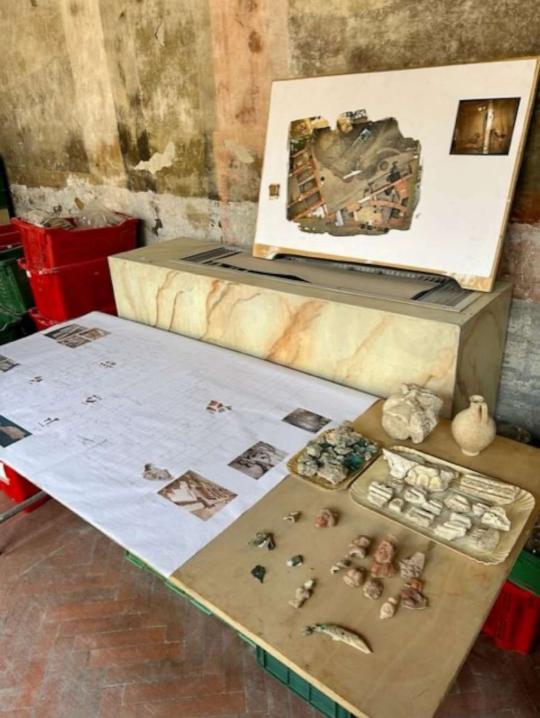
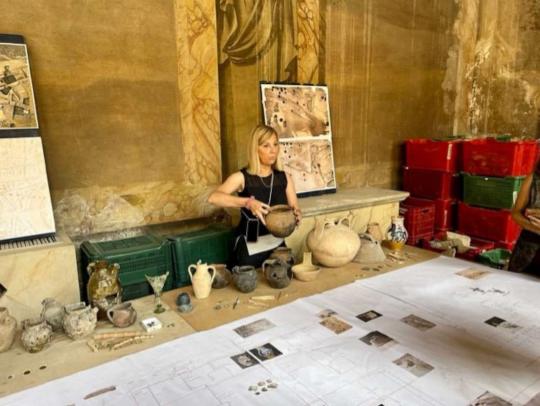

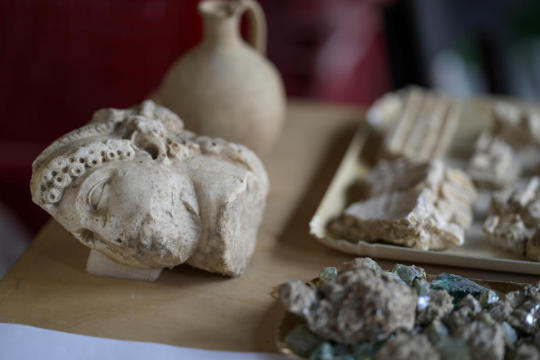



Artifacts from the excavation will be put on display and added to a "city-run public databank to add to the wealth of information gathered over the years on life in Rome throughout the centuries," according to ABC News.
Archaeologists plan to rebury the theater once excavations wrap up.
By Jennifer Nalewicki.



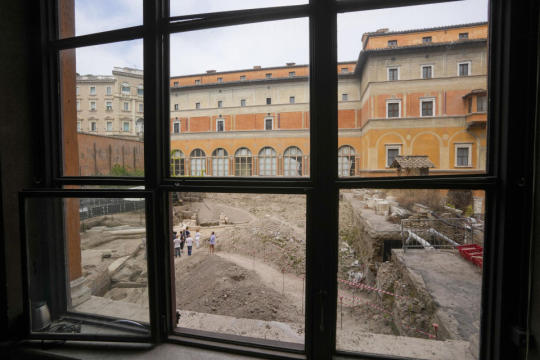
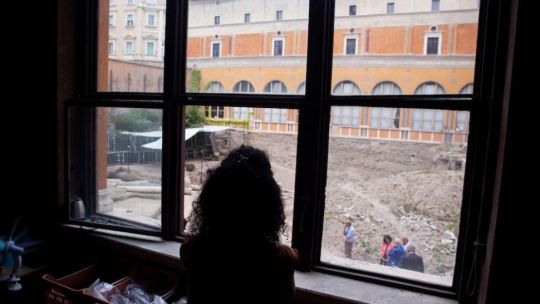
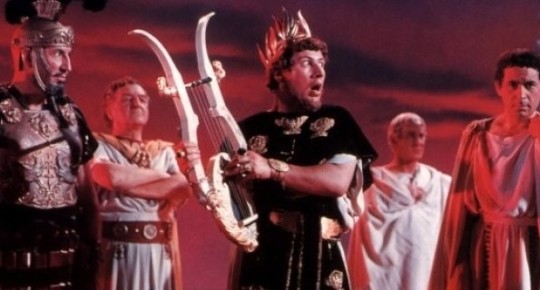

#Emperor Nero#Theatre of Nero#Ruins of Roman Emperor Nero's 'Theatre' Unearthed in Rome#ancient artifacts#archeology#archeolgst#history#history news#ancient history#ancient culture#ancient civilizations#ancient rome#roman history#roman empire#roman emperor#long reads
307 notes
·
View notes
Text
The universe is not made of matter — but music...

When walking past a blacksmith, Pythagoras noticed a strange harmony in the sounds of banging hammers.
He realized that two hammers make a harmonious sound if one is exactly twice as heavy as the other.
He worked out this 2:1 weight ratio produces an octave (notes separated by an octave sound alike).
Likewise, a 3:2 ratio creates a perfect fifth, and 4:3 a perfect fourth. This discovery evolved into our musical scale of today...
It wasn't just weight — a note's pitch is inversely proportional to the length of the string that produces it.
Pythagoras had discovered that sounds can be harmonious together because of a mathematical relationship between them...
This got him thinking. If music is essentially math, perhaps the universe *itself* is also governed by mathematical patterns?
Eventually he came to the idea that the universe and everything in it is vibrating. As math and music are interconnected, the universe too is musical. In that sense, "physical matter is music solidified."

He developed a theory called the "music of spheres," that celestial bodies "hum" a kind of music as they move, unheard by human ears:
"There is geometry in the humming of the strings, there is music in the spacing of the spheres."

He mapped the sun and planets, assigning each a unique tone based on distance and orbit.
We cannot hear this music with our ears — but it's heard by the soul...

Pythagorean thinking carried into the Middle Ages, with Boethius explaining the 3 kinds of music:
Musica mundana: unheard music of the cosmos
Musica humana: harmony between body and soul
Musica instrumentalis: music of instruments
These weren't just radical, isolated theories. This worldview permeated society for centuries.
People believed the universe was bound by a mathematical, musical harmony.
The idea was that music, math, and the cosmos were inextricably linked.
The universe was deeply mathematical and God must himself be a divine geometer.

So, if the universe is one great musical composition, how do you live your life to be in tune with it?
Well, by making music that connects you to that divine order — but you can do it in visual art too...
Art from antiquity to the Renaissance and beyond tapped into that mathematical order.
The Golden Ratio fascinated artists from Da Vinci to William Blake, who knew mathematical harmony touches us with a sense of otherworldly beauty.
In architecture, cathedral builders wove Gothic facades with immensely complex geometry.
As Pythagoras had found harmony in the mathematical order of music, geometry could produce visual harmony.

Music and visual beauty were bound by the same divine forces — notice the similarity of vibrations of musical notes in water and rose windows.
"Music is liquid architecture; architecture is frozen music."
Medieval people's obsession with math might seem strange or unnecessary to the modern-day architect.
But the results speak for themselves.

19 notes
·
View notes
Text
Hey. Have you ever wondered what each boss fight OST could mean for each bishop? No? Well too bad!!! This is all about that!!!!! (Links to the songs are on the names :] )
Leshy’s theme
Leshy’s boss fight is usually the first one you go through- though you can defeat whatever boss you want first, he would be the most common option since Darkwood is the first zone you unlock.
His theme is very simple when compared to the others? The whole song feels very magical, in a similar way like a fantasy world- it reminds me of medieval bards probably because of the string instruments. And the whole magic thing is blame of the chorus that shit goes hard
The lack of complexity of Leshy’s song could show that this is a bit of a first- he hasn’t fought much in his eldritch form before, so he does as best he knows with little thought. Him being the “first” boss also makes him a somewhat easier opponent, so it only adds on to this. Also the ending of the song really makes it seem like something surprising has happened- again because of the chorus. Very probably because. You know. First bishop who EVER got killed. Bit of a shocker. Things are going to change from now on you feel me.
Heket’s theme
Heket’s theme goes HARD. It’s probably my favorite one
The the first few seconds of the intro SCREAM destruction. This girl is there to demolish you and to make sure the One who Waits stays chained FOREVER. It’s very fast paced and it keeps going fast for a while before a chorus kicks in and holy SHIT I don’t know why but the melody it follows just. Makes me think of sorrow. Of how sad all of this prophecy really is and how this has affected Heket for CENTURIES now.
AAAND this is BACKED UP by dialog!!! If you go to Anura without killing Leshy she says this:
“The Bishops… my family. Have they not suffered enough? Have I not suffered enough?”
“We fought, pathetic vessel. We bled. We grieved. And yet the Red Crown wants more. No more.”
HELLO??? LIKE SHE’S SO SAD AND IT SHOOOWSSS IN HER FUCKING OST i love this game:;;:; the fact that she remarks that they GRIEVED the loss of her brother too- this poor girl has to every reason to never miss or think about her brother but how can she?? He was one of her older brothers, one of her mentors. Of course she misses him and probably still hurts because of his betrayal- both emotionally and literally because of her injuries. But you think she’s going to let her “feelings” get in the way???? NO. She’s going to kill you. That’ll make her feel better (eternal denial)
Kallamar’s theme
The build up of Kallamar’s theme genuinely just reminds me of royalty and. Mermaids. This squid is out here to show just how GOOD he is at killing lambs. KING of lamb slaughter you could say. LORD of murder. The chorus it has and the instruments really make it look like he’s a force to be reckoned with and that his fight will be filled with power!! With the grace only a king and a god could have!!! But even so it still has a few parts near the middle where it like slows down and shows maaybe a bit of insecurity. Knowing Kallamar wanted to avoid this fight at all costs it wouldn’t surprise me that his confidence in fight comes and goes in flashes, much like the parts with flutes and singing after the “greatness” introduction. My poor man is having a crisis out here someone help him
Shamura’s theme
Something that really catches my attention is that unlike the rest of the boss themes, this song has no initial build up or intro. It’s pretty straightforward. And honestly??? (WARNING: SHAMURA PROPAGANDA) it just shows how important they are. They need no introduction, they’re the bishop of war and knowledge! The one and only, Shamura!!! You already know who it is, they don’t have to make it clear with an introduction. It’s either that or a reflection of how used they are to war and combat, so they don’t make it as much of a big deal as their siblings. OR since they already knew it was going to happen, it simply isn’t big news and they’ve been waiting for this to happen for too long to care.
It’s also really quick paced and goes very well with their boss fight, considering how aggressive it is compared to Leshy’s or Heket’s. Even so, like the others it has a part in the middle where it slows down a little and has a smaaaall little chorus in the back before building back up to a quicker pace. Could be that they’re analyzing what’s going on or that their injuries are acting up again so they need a breather- it also gives it this slightly sorrowful feeling to it AUGH.
The ending of the song is also different, like Leshy’s. Though the ending of Shamura’s theme really make it sound like something big happened- not because it has never been seen before but because its over. There’s no more bishops, the Old Faith is fucking gone. If you beat them last, that is JWRBIFDNB
Narinder’s theme + The One who Waits’ theme
Hooooly shit these two songs go hard. Also two of my favorites.
The introduction makes it SO clear that something has unleashed like you don’t have to be playing to know something BIG is happening. This one has only a voice and the bass- it makes it feel very majestic and divine in a way I can’t really explain, if you get it you get it. Honestly I have no comments. It’s mystical, it shows that you are fighting a GOD and that is IT.
The fact that it’s two separate songs also makes me think a lot about how Narinder was part of the Old Faith, but The One who Waits is NOT. Basically when comparing osts Narinder’s theme sounds a lot more like what we’ve seen with the other bishops while toww is a LOT more aggressive and just overall heavy handed?? It makes me think that like he’s DONE playing around.
Other things I noticed:
All mini-boss themes are similar to a small sample of their respective bishop
Other locations like Sozo’s cult or Midas’ cave also have similarities to the bishop’s themes or rather their areas
Baal’s theme is longer than Aym’s. Could mean many things, like Baal is older or that his fight takes a bit longer. Most people know Aym is the weakest link since he falls coughing after some attacks he makes, so it only makes sense
Narinder’s theme is more similar to Aym’s and The One who Waits’ is more similar to Baal’s
Shamura’s theme is the longest between all bishops with 2:35 minutes
WOW this took a minute but yeah. I hope everyone likes it!
I’d love to see what all of you think!! Maybe you think I’m absolutely wrong or want to add on- either way I will read everything with them big old eyes ❤️
#cult of the lamb#cotl#cotl leshy#cotl heket#cotl kallamar#cotl shamura#cotl narinder#cotl toww#cotl the one who waits#bishop leshy#bishop heket#bishop kallamar#bishop shamura#bishop narinder#the one who waits#leshy#heket#kallamar#shamura#narinder#toww#cult of the lamb headcanons#cotl headcanons#headcanons
186 notes
·
View notes